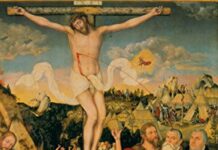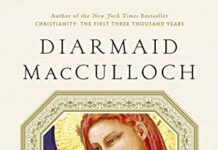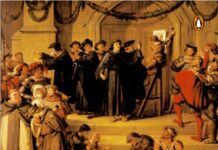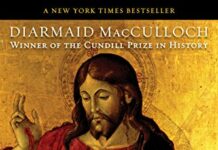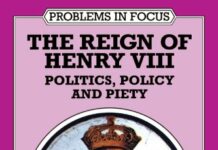
Ebook Info
- Published: 2004
- Number of pages: 864 pages
- Format: PDF
- File Size: 8.42 MB
- Authors: Diarmaid MacCulloch
Description
A masterpiece … In its field it is the best book ever’ Guardian Winner of the Wolfson Prize for history, Reformation: Europe’s House Divided 1490-1700 charts a seismic shift in European culture that marked the beginning of the modern world. At a time when men and women were prepared to kill – and be killed – for their faith, the Reformation tore the western world apart. Acclaimed as the definitive account of these epochal events, Diarmaid MacCulloch’s history brilliantly re-creates the religious battles of priests, monarchs, scholars and politicians, from the zealous Martin Luther nailing his Theses to the door of a Wittenburg church to the radical Ignatius of Loyola, founder of the Jesuit order; from Thomas Cranmer, martyred for his reforms, to the ambitious Philip II, unwavering in his campaign against Europe’s ‘heretics’. Weaving together the many strands of Reformation and Counter-Reformation, ranging widely across Europe and even to the new world, MacCulloch also reveals as never before how these upheavals affected everyday lives – overturning ideas of love, sex, death and the supernatural, and shaping the modern age. ‘Magisterial and eloquent’ David Starkey ‘A triumph of human sympathy’ Blair Worden, Sunday Telegraph ‘From politics to witchcraft, from the liturgy to sex; the sweep of European history covered here is breathtakingly panoramic. This is a model work of history’ Noel Malcolm, Sunday Telegraph Books of the Year ‘Monumental … Reformation is set to become a landmark’ Lisa Jardine, Observer Diarmaid MacCulloch is Professor of the History of the Church at Oxford University. His Thomas Cranmer won the Whitbread Biography Prize, the James Tait Black Prize and the Duff Cooper Prize. He is also the author of A History of Christianity: The First Three Thousand Years.
User’s Reviews
Editorial Reviews: About the Author Diarmaid MacCulloch is Professor of the History of the Church at Oxford University. His Thomas Cranmer (1996) won the Whitbread Biography Prize, the James Tait Black Prize and the Duff Cooper Prize; Reformation: Europe’s House Divided 1490-1700 (2004) won the Wolfson Prize and the British Academy Prize. A History of Christianity (2010), which was adapted into a six-part BBC television series, was awarded the Cundill and Hessel-Tiltman Prizes. His Gifford Lectures at the University of Edinburgh were published in 2013 as Silence: A Christian History. His most recent television series (2015) was Sex and the Church. He was knighted in 2012.
Reviews from Amazon users which were colected at the time this book was published on the website:
⭐Fabulous book. Incredibly tiny font size. Illegible. Unfortunate.
⭐Superbly crafted analysis and writing
⭐I would highly recommend the book except that it is riddled with typographical errors through out. In most of the errors, whole words are broken up with a space in between the parts of the words. I am not sure whether it is the responsibility of the publisher or Amazon to have the book fixed and replace the currently flawed one. I personally feel that it is simply unacceptable to have this level of errors occurring in a book that is offered for sale. So in conclusion, get the printed book and avoid the ebook all together till it is fixed.
⭐Probably the best-written and most accessible one-volume history of The Reformation. The advantage of the Kindle edition is that you can make the font bigger as that is the one issue with the print version if you don’t have 20/20 vision!
⭐A wealth of information. Engagingly written. Terrific insights into the “why” the Reformation happened and the consequences for the world today.
⭐A very readable and insightful survey of the reasons and motivations for the religious divisions that characterise the Reformation period.
⭐Magisterial in is scope this thorough account of the Reformation, Diarmaid MacCulloch’s work is by far the most useful and enganging text on this subject. While other books have a tendency to focus on the main figures involved, Reformation: Europe’s House Divided gives a perspective on all layers of society from the emperor down to the peasant attending their parish church. The reformation that took place in the Roman Catholic Church has also been given the coverage it deserves.With a style which is easy to read, Reformation is thoroughly referenced with over sixty five pages of notes and a very useful further reading section.Read this book. Highly valued and recommended.This is an easy to read work and
⭐This was a very thorough book and I won’t go into it since the other reviews cover that well.I am suprised that no one has really mentioned the difficulty in understanding concepts presented in the book. The author glosses over things that he assumes the reader already knows. I have taken a college level course in religion, so I am not unfamiliar with basic concepts, but my knowledge of Erasmus and Animism is lacking (not to mention a few others). Without this you miss much of the detail. I finished the book but I cannot say that my knowledge of specific incidents grew much. I think I got more out of this book in terms of overall impression of the life and times with respect to the church.Overall a quality book. Not everyone may be ready for it though.
⭐Can be a very processional collection of names places and narratives, but for the armchair historian or someone with more knowledge of these dark days that led to what some europeans label ‘World War Zero’, it is both challenging and engaging.One star removed for the author’s absurd ‘Atlantic Isles’ political bias. The rest of the world has always called these islands the ‘British Isles’, Mr Blackford and friends…
⭐A fantastic and very long book! It encompasses the reformation across the continents of Europe and the Americas. It concentrates mainly on Europe, however; that is, the Holy Roman Empire, Spain, England, Scotland, the Netherlands, Italy, Poland, Lithuania, Norway and Sweden etc. It covers in detail both the reformation and counter-reformation over two or three centuries. It delves deeper into the myriad different, smaller and disunited sub-confessions of Protestantism, mainly, the differences (and antagonisms) between Lutheranism and Reformed Protestantism, but also the myriad of other smaller sub-confessions such as the Quakers, Methodists, Presbyterians, Puritans, Anabaptists, gnesio-Lutherans, Arminians, Huguenots etc. Also, the roles of various orders such as the Society of Jesus, (Jesuits). It also introduces all the major figures of the reformation and counter-reformation, such as Martin Luther, John Calvin, Zwingli, Bucer, (countless other theologians); the various Popes, the Emperors of the Holy Roman Empire, the Hapsburgs, the monarchs of Spain, Britain and France etc. A very detailed and comprehensive book!
⭐I came at this book from a Reformed background that many would fine to be rather extreme, however I got an immense amount out of this excellent book.While MacCulloch is certainly not impartial (lets face it, who is) he is always fair even if you disagree with his conclusions this book accomplishes what appears to be one of its main aims of putting each element of the reformation in its proper context, which I realise now I have often been lacking. I am now convinced of the futility of considering elements of the reformation in isolation from the bigger picture, for instance to understand Geneva you have to understand Germany and to understand the English reformation (if indeed there actually was one) you have to understand the continental situation. More to the point to understand the 16th century you have to understand the 15th century and so on.I now feel much closer to the momentous events of the reformation and the secondary causes that underpinned the political and theological developments that occurred.
⭐I would venture to say that this is the best book there is on the subject of the reformation.I particularly liked the way he was aware of the limited knowledge of the general reader. He has taken great care to impart his expertise gradually which is to be lauded. Where topics have been mentioned in passing he provides, in brackets, a page reference where the subject is covered in more detail. This is helpful because the reformation is a broad subject and a lot of topics are covered in the book’s 700 pages.He is an eloquent and elegant writer and you really get the sense that this guy knows what he is talking about. He has thoughtfully compartmentalised the book brilliantly as only an expert could do.Obviously in an overview of the subject, everything is touched upon without going into too much detail. But this isn’t a bad thing as he has expertly chosen what he thinks is most important for the reader to gain a full understanding of those tumultuous years.It is an excellently structured book, never being desultory or hard to follow. The first part gives an introduction to the subject, the second is the reformation and its aftermath, and the short third part gives an insight on what it was like to live through. This final part also devotes a couple of chapters to attitudes to love and sex during the reformation.If you look at the back of the book, you will not only find references and notes, but Mr Macculloch has also provided a list of further reading that he recommends on subjects that may have piqued your interest.A more panoramic view of the this period will be hard to find.
⭐I disagree with some of the other reviews here that this is bland or a difficult read – I approached it with some tripidation but found it both reassuringly scholarly and yet immensely readable, probably because the author has a distinctive ‘voice’ which mediates perfectly through the vast amount of material he covers. MacCulloch knows his material intimately and yet manages to convey the complexities without ever resorting to the fatal dumbing down of many authors. As someone with a vague idea of the history of the period, but little knowledge of religious philosophy, I wasn’t sure if this would be too ‘technical’ but actually I found it fascinating and unputdownable. It dropped a star because at some points I felt MacCulloch was trying to cram in too much e.g. the complexities of religious thought across the whole of Europe, but the third section in particular on the differences the reformation made to actual peoples’ lives in terms of the way they thought about sex and the family, for example, more than made up for some of the intricacies. All together a brilliant read.
Keywords
Free Download Reformation: Europe’s House Divided 1490-1700 in PDF format
Reformation: Europe’s House Divided 1490-1700 PDF Free Download
Download Reformation: Europe’s House Divided 1490-1700 2004 PDF Free
Reformation: Europe’s House Divided 1490-1700 2004 PDF Free Download
Download Reformation: Europe’s House Divided 1490-1700 PDF
Free Download Ebook Reformation: Europe’s House Divided 1490-1700

